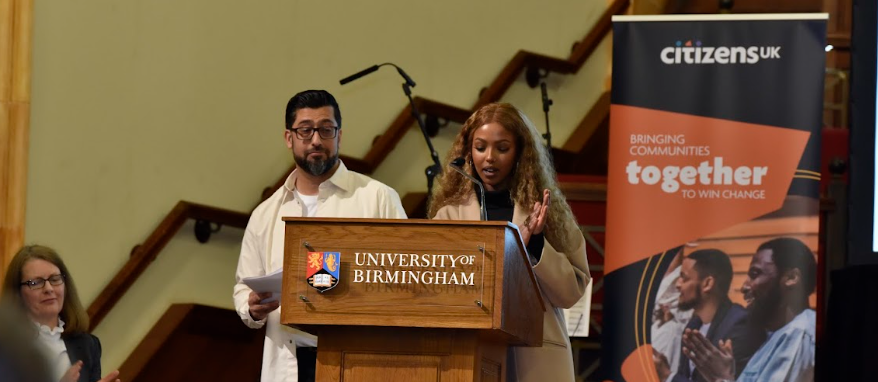
On the 25th of April 2024, I had the profound opportunity to witness community organising at its finest during the Mayoral and Police & Crime Commissioner Accountability Assembly, orchestrated by Citizens UK Birmingham. Months of meticulous planning, rooted in listening, one-on-one meetings, and storytelling, culminated in this important event. Over 600 attendees filled the Great Hall at the University of Birmingham, setting the stage for a powerful evening of commitment and accountability. These attendees are mostly members of Citizens UK’s Birmingham Chapter and Citizens UK alliances.
Supported by a diverse group, their principal partners: the University of Birmingham, Birmingham Newman University, Aston University, Queen’s Foundation, and Bournville Village Trust. These provide invaluable support and collaboration.

Next are their member Schools, the future generation: St Francis’ Catholic Primary School, St Clare’s Catholic Primary School, King Edwards,
Handsworth Wood Girls’ Academy, Ark Victoria Academy, and Ark Tindal Primary.
They are also, strengthened by member Faith institutions: Birmingham Methodist Circuit, Birmingham and Wolverhampton & Shrewsbury Methodist Districts, Birmingham Progressive Synagogue, St Francis Church & Sisters of Mercy, Handsworth, St George’s Church, Edgbaston, KSIMC Birmingham, Huda Masjid & Community Centre, Nishkam Civic Association.
And finally, members from Community organisations, unions and social enterprises bring a wealth of experience and grassroots connections: Aspire & Succeed, Ashley Community Housing, BLESST Centre, Saathi House, DaEro Community Forum, Communities Engage & Thrive, Tao Centre, Dream Chaser Youth Club, B32 Community, Sister Care, Afghan Community & Welfare Centre, European Welfare Association, UNISON Colleges branch Birmingham, and Aston Students’ Union.

All attendees were welcomed and introduced to Citizens UK, the event’s organisers, and the evening’s agenda.
After a short but powerful poetry performance by a young student, we were introduced to our special guests for the evening: the mayoral candidates Andy Street (Conservative) and Richard Parker (Labour), and the Police & Crime Commissioner candidates Simon Foster (Labour) and Tom Byrne (Conservative). After hearing stories shared by people with lived experience on issues that matter most to residents of West Midlands, each candidate was called to respond and pledge to, should they win their election bids, work with Citizens UK Birmingham to make changes in the areas of:
– Housing: Building family homes for social and affordable rent and developing a landlord’s charter.
– Employment: Building a Community Jobs and Skills Compact that is community-led.
– Safety: Producing long-term area action plans and training police for better community engagement that is free of abuse and harassment.
All the candidates responded positively and said yes to all the questions.
This event used listening campaigns, house meetings, one-to-one meetings, and micro-organising practices like timekeeping and storytelling to get positive outcomes.
To understand and appreciate the value of accountability assemblies for our churches, we need to take a closer look at the practices and tools used to organise them, and learn from those experiences.
The Power of Accountability Assemblies
What is an accountability assembly?
An accountability assembly is a dynamic tool used by community organisers to secure public commitments from politicians and hold them accountable. These assemblies typically occur shortly before elections, ensuring politicians are most attentive at this time. They differ from hustings by focusing on building relationships with leaders first and sharing testimonies from those directly impacted by the issues, so they are informed and understand why the community is asking for change. This foundation then sets the stage for the asks, fostering an atmosphere where the electorate’s voice is powerfully amplified to demand an active response.
Why Public Assemblies Are Effective For Influencing Decisions
Public assemblies can be a powerful tool to influence policy and create positive change. Here’s how:
– Strategic Timing: Assemblies held close to elections catch politicians’ ears when they’re most interested in public engagement. Planning and strategising from previous meetings and contributions by leaders help to emphasise the collective message and maximise impact.
– Preparation: Months of planning ensure clear issues and realistic solutions. Assemblies focus on crafting actionable plans.
– The Power of Stories: Personal stories from those impacted by the issues add an emotional dimension and are chosen for impact and integrity.
– Transparency and Accountability: Public assemblies ensure transparency, empowering the electorate to hold their representatives responsible. Every pledge made by each candidate is witnessed by the crowd at the event, this is why turnout is important and allows voters to hold them accountable for their promises.
What Can We Learn?
The Methodist Church, with its rich tradition of meetings and community engagement, can benefit from adopting the practices of accountability assemblies. Here is how:
– Encourage Intentional Relationship Building: Just as accountability assemblies rely on strong relationships within the community, the church should foster robust connections in the congregation and the wider community.
– Initiate Listening Campaigns: Conducting listening campaigns can help identify issues affecting the congregation and the community. This mirrors the one-on-one meetings and storytelling sessions that precede an accountability assembly.
– Building Teams with Organising Practices: Establish teams and develop existing ones with micro-organising tools and practices, with specific priorities identified through listening campaigns. These teams can strategise and plan around these issues, ensuring focused and effective action.
– Encourage Broad Participation: Mobilising church members to attend events ensures a strong turnout and visible support, much like the impressive turnout at the mayoral assembly.
– Share Personal Stories: Integrating personal testimonies during church events can highlight the real-life impact of the issues being addressed, similar to the emotional storytelling in accountability assemblies.
– Training and Preparation: Providing training in community organising, public speaking, and leadership, can empower church members to participate effectively and make a significant impact.
– Micro-organising Techniques: Employ tools such as rounds of questions, timekeeping, agenda design, and evaluation to improve the efficiency of church events and ensure they are action-oriented.
The Takeaway
Key aspects of accountability assemblies offer a powerful model for harnessing the collective energy of our church community. By fostering strong relationships, listening deeply, and empowering our members, we can become a driving force for positive change in our communities.

Leave a Reply